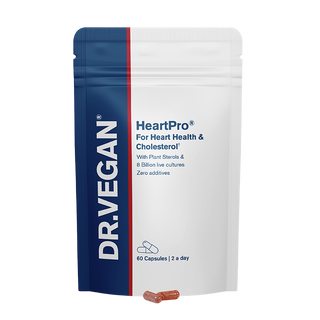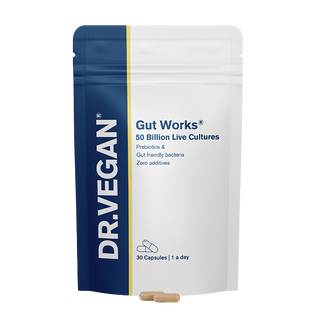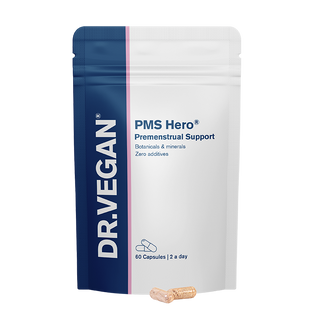Why the hype about Apple Cider Vinegar?

By: Shona Wilkinson
Apple Cider Vinegar (ACV) is all the rage these days. It is thought to have a host of health benefits, from helping manage blood sugar and supporting weight loss to relieving bloating and aiding PMS symptoms. However, just because there's hype doesn't mean everything you read is true and as always, we're here to bring clarity to nutrition and your supplements. Here we look at the studies into Apple Cider Vinegar, what it does do and what it doesn't, and separate fact from fiction.
What is Apple Cider Vinegar?
Apple Cider Vinegar (ACV) is a type of vinegar created through a two-step process involving crushing apples and extracting the liquid, which is then fermented by adding bacteria and yeast. The result is vinegar that acquires a sour taste and retains some of the apple's nutrients which themselves can have health benefits.
What are the potential health benefits?
While there are lots of studies into the potential health benefits of Apple Cider Vinegar (ACV), it is important to remember none of the claims you may read about ACV have been clinically studied, peer reviewed, proven or approved by the regulator, The Food Standards Agency. None of the claims you may hear companies make regarding ACV are 'approved claims', and while there are plenty of studies into the benefits of ACV, it is prohibited for companies to make health claims regarding ACV because the benefits have not been clinically proven.
Here are some of the potential benefits of ACV.
Weight loss
One of the most common reasons for taking ACV is for supporting weight loss. Some studies suggest that ACV may help increase feelings of fullness, potentially leading to reduced appetite and lower calorie intake. This is because it is suggested ACV slows down the rate at which food leaves the stomach. This delay in gastric emptying may be attributed to the acetic acid content in ACV, and one study into ACV showed the effect was more marked in those with diabetes. Another viral drink that is linked to weight loss is 'Oatzempic'.
There is no magic solution to weight loss, and when wanting to lose weight healthily, it can be hard to know where to start. Learn more from our nutritionists on their tips for healthy weight loss.
What's your diet missing? Create your free Diet Profile.
Blood sugar control
Some studies suggest ACV may have a modest effect on blood sugar levels, particularly in individuals with diabetes, and that ACV may help improve insulin sensitivity and lower post-meal glucose levels. Some studies also show ACV may also help regulate the rate at which glucose is released into the bloodstream, preventing spikes and crashes in blood sugar levels.
You may also be interested in the '10 signs of diabetes to look out for'.
Cholesterol and heart health
Some research suggests that ACV may positively impact cholesterol levels, potentially reducing the levels of total cholesterol and triglycerides. Again, a lot more research is needed.
The studies behind the benefits of ACV for heart health centre on 'acetic acid', which is in ACV and has been shown to stimulate the production of bile acid in the liver, which is made from cholesterol. Increasing bile production uses up cholesterol stores and is one way to help lower cholesterol. ACV also contains antioxidants such as polyphenols, which are associated with potential cholesterol-lowering effects. These antioxidants may help prevent the oxidation of LDL cholesterol, which is considered a risk factor for heart disease.
Learn more about how you can keep your heart healthy with our 'Nutritionist's food guide for a healthy heart'.
Gut health and bloating
Apple Cider Vinegar contains beneficial bacteria and enzymes that may promote a healthy gut microbiome. It has been suggested that ACV could help alleviate bloating and support digestion, and we do know that ACV can help to balance the acidity of the stomach, which in turn regulates the gut bacteria and digestion.
You may also enjoy reading '6 signs of an unhealthy gut' and 'How to look after your gut through your diet'.
HeartPro®

Skin health and infection prevention
ACV contains antioxidants, such as polyphenols, which have the potential to counteract oxidative stress and reduce damage caused by free radicals. This antioxidant activity may indirectly support skin health by reducing irritation and protecting against environmental damage. Improving gut health directly benefits the health of your skin through the gut-skin axis.
The gut-skin axis is where the gut directly affects the skin. ACV's role in promoting a balanced gut microbiome and reducing irritation could contribute to healthier skin and help improve the skin barrier function, and prevent skin infections. It's important to note that eating a balanced and nutritious diet is the foundation for a healthy, radiant looking skin. ACV can also be applied topically when diluted on unbroken skin. It is naturally antibacterial and may help a wide range of conditions.
You may also be interested in the causes and triggers of eczema or rosacea, explained in 'Natural ways to prevent and treat Eczema' and in '5 Natural remedies to help treat rosacea'. Pairing Skin Saviour® and Vegan Omega 3 together can help nourish your skin from the inside out and reduce tenderness.
Apple Cider Vinegar's potential effects on blood sugar regulation and digestion could contribute to managing certain PMS symptoms. Some individuals experience changes in appetite, cravings, and digestive issues during the premenstrual phase, and ACV's ability to regulate blood sugar levels and support digestion may offer some relief.
However, ACV should not be considered a solution for managing PMS symptoms. You should consider lifestyle modifications, dietary adjustments, stress management techniques, other nutritional support or specialist PMS supplements.
If you are looking for support for PMS, consider the best-selling PMS Hero®. PMS Hero® is an advanced formula of clinically tested botanicals, vitamins and minerals to support common effects of your period including cramps, breast tenderness, bloating, mood swings and cravings. It works to balance your hormones for a better mood, body and mind every day. 9 out of 10 women who take PMS Hero® find it effective.
How much ACV should I take?
The recommended dose is 10 ml just before a meal. If pure Apple Cider Vinegar is too strong for you, you can dilute it in a small amount of water.
If you are taking ACV long-term, you should consider drinking it with a straw to protect your teeth. A straw can be placed at the back of your mouth, which means the ACV bypasses your teeth.
What about ACV Gummies?
Gummies have become popular as a way of consuming vitamins, however in general they contain very low levels of active ingredients. In most cases gummies also contain lots of sugars and sweeteners to improve taste and texture, which have nasty side effects and often cancel out any benefit of consuming them in the first place. Learn more about the risks of sweeteners and type-2 diabetes.
These issues are true for ACV gummies, which in general have very low levels of ACV, contain sugar and sweeteners, and are likely to include unnecessary additives and colourings.

What else can help?
When it comes to weight loss, cholesterol and your heart health, gut health, blood sugar control and your skin, your diet is always the first place to look when looking to make changes because it has the biggest impact on all these areas of your health. Discover if you're gaining the right nutrients in your diet by creating your free online Diet Profile today - it only takes 3 minutes.
You can also consider natural supplements which contain zero nasty additives, zero colourings and zero sweeteners. Discover our award-winning range of supplements including:
- GlucoBalance® | Advanced Blood Sugar Control
- PMS Hero® | Support PMS
- HeartPro® | Heart Health & Cholesterol Support
You may also enjoy reading:
- Do meal replacement shakes work?
- Exposed: Plant-sweeteners and type 2 diabetes
- Best foods for Type 2 diabetes
- Is sugar actually that bad for you?
- Does sperm impact the risk of diabetes?
- 5 cholesterol myths busted
- The link between yeast infections and diabetes
Want to hear more from our nutritionists? Sign up to our email newsletter for insights and exclusive offers:



















